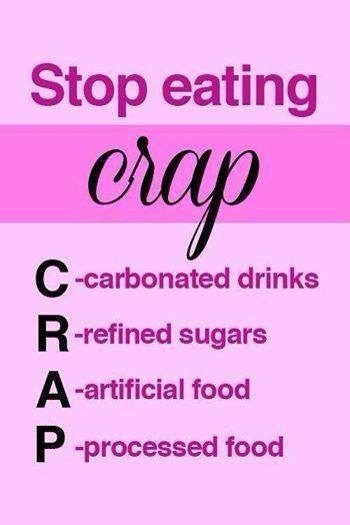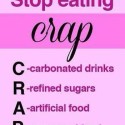Food communication can be very confusing. Today’s dietary advice claims that carbs are bad, yesterday it was fat. Should we really all be ramping up on protein? Where is the truth in it all?
 “Low-carb,” “Low-fat,” “High-protein:” Bad advice in general.
“Low-carb,” “Low-fat,” “High-protein:” Bad advice in general.
Carbohydrates (or carbs), fat and protein are all macronutrients, essentially components needed by our bodies for energy and health. That’s right, ALL are needed. Anytime someone says that one of the essential macronutrients is “bad,” they should be dismissed. All they are promoting is propaganda that will further hurt our bodies.
I get so tired of the current “carbs are bad” mantra.
Not all carbohydrates are made equal. But they ALL start as plants. Plant-based whole, unrefined carbohydrates are our lifeblood, where many of the micronutrients (vitamins, minerals, enzymes, antioxidants, phytonutrients, etc.) and all of the fiber are found. Carbohydrates, through digestion, break down into glucose. Our bodies are genetically programmed to seek out carbohydrates. Every cell in our bodies needs glucose to survive. Unfortunately our DNA does not discriminate against healthy, whole plant-based carbohydrates and processed forms of sugars and carbohydrates.
Micronutrients (the things that help our cells thrive!) are regularly downplayed in favor of a debate over macronutrients (protein, carbohydrate and fat). They are ALL necessary parts of our physiology and life! But you do not obtain a storehouse of micronutrients or fiber from fat and proteins. In fact, there is no fiber in fat or most protein. The relatively small amount of micronutrients found in protein are generally there because of the plants that the particular animal ate, but are then nullified when we cook the meat. There are no micronutrients in fat.
So…carbohydrates are good!
Yes, even starchy carbohydrates (e.g. white potatoes, yams, sweet potatoes, butternut squash, rice, quinoa, etc.) are essential in our diet. The importance here is that they need to be eaten in such a way as to minimize the glycemic load (not just the glycemic index of each separate food item). So…what you eat them with (and what you put on them) makes a difference.
It is the highly refined, chemical-laden food-like substances that are generally put into bags and boxes, found on an isle in the middle of the grocery store or in vending machines, that many people call carbohydrates that are bad. If it didn’t grow from the ground, a tree or a bush, it is not the good type of carbohydrate. Have you ever seen a bread tree, bagel bush or potato chip plant? No? Then they are processed and not good for your health.
The “low-carb” craze has done nothing good for our health.
People have demonized the good starchy carbs and failed to recognize that processed carbohydrates and sugar were really what this was supposed to aim to reduce. Since the body only allows you to go on a starvation diet for so long, a decrease in “carbs” is not done by decreasing overall calories. It has resulted in an increase in calories coming from protein, fat and processed “low carb” snacks. It has also resulted in higher sugar cravings (because healthy carbohydrates break down into glucose to feed our cells and when they don’t have it, they crave sugar).
The low-carb craze has resulted in fiber and micronutrient deficiencies, which lead to digestive disorders, inflammation and a host of other resultant diseases. We do not need to decrease carbohydrates, which include fruits, vegetables and all plant-based foods! We DO need to decrease the consumption of processed carbohydrates and sugars!
We also need fat!
The only thing the “low-fat” craze caused was another resultant increase in sugar consumption. Food without its natural fat tastes like cardboard, so manufacturers replaced the fat with sugar and made it “low fat.” Fat is also an essential part of our diets. It lubricates our joints and nerves and aids in the digestion of essential micronutrients. Too little fat in the diet can result in poor vitamin absorption, depression, increased cancer risk, high cholesterol and heart disease, imbalances of nutrients (too much of something else) and overeating because you never feel “full.” Candy is even labeled today as “low-fat (e.g. Twizzler, Sour Patch Kids), as if by labeling them such, we might consider it a “healthy” option. But what we DO need to take into consideration is the fat type. We were meant to take in omega 6 and omega 3 fatty acids in balance 1:1 or 2:1. Today, Americans consume them at a rate of 40:1 or 50:1. Together with sugar consumption, these are the greatest contributors to disease!
Protein should be the smallest percent of the macronutrients consumed.
The “high protein” craze has been equally damaging but for other reasons. Again, our body needs so many calories for its basic energy expenditure, so if we increase protein, often from meat sources (which also throws off the omega fatty acid balance), what we decrease is carbohydrate consumption. As mentioned above, when consumed appropriately as whole, plant-based foods, carbohydrates are the essence of our energy, health, vitality and waste elimination system (think fiber). In addition, high animal food consumption has been shown to cause a shift in the body pH. The body is designed to maintain a neutral pH (acid-alkaline balance), so when it becomes too acidic (as it does from a high level of animal products), our immune system is at risk and our bones begin to leach minerals in an effort to buffer the pH. Oh yah, those plants I mentioned, they are what is alkaline in our diet, so they help to buffer the pH naturally, when eaten. Also, research has shown that consuming a diet of animal proteins in excess of 10% of your daily caloric intake increases IGF-1, which stimulates tumor growth. Yes, you read that right. High meat consumption (especially in the absence of tons of wholesome fruits and vegetables) increases tumor growth.
Moderation is key!
Can’t we please learn from our mistakes? Food is not an all or nothing and there is no magic pill. We need all of the macronutrients (carbohydrates, fat and protein) as well as the precious micronutrients primarily found in whole, plant-based carbohydrates. Michael Polan said it well, “Eat food, not too much, and mostly plants.”
Sign up to receive my FREE e-book: Tips to Health Through Clean Living





